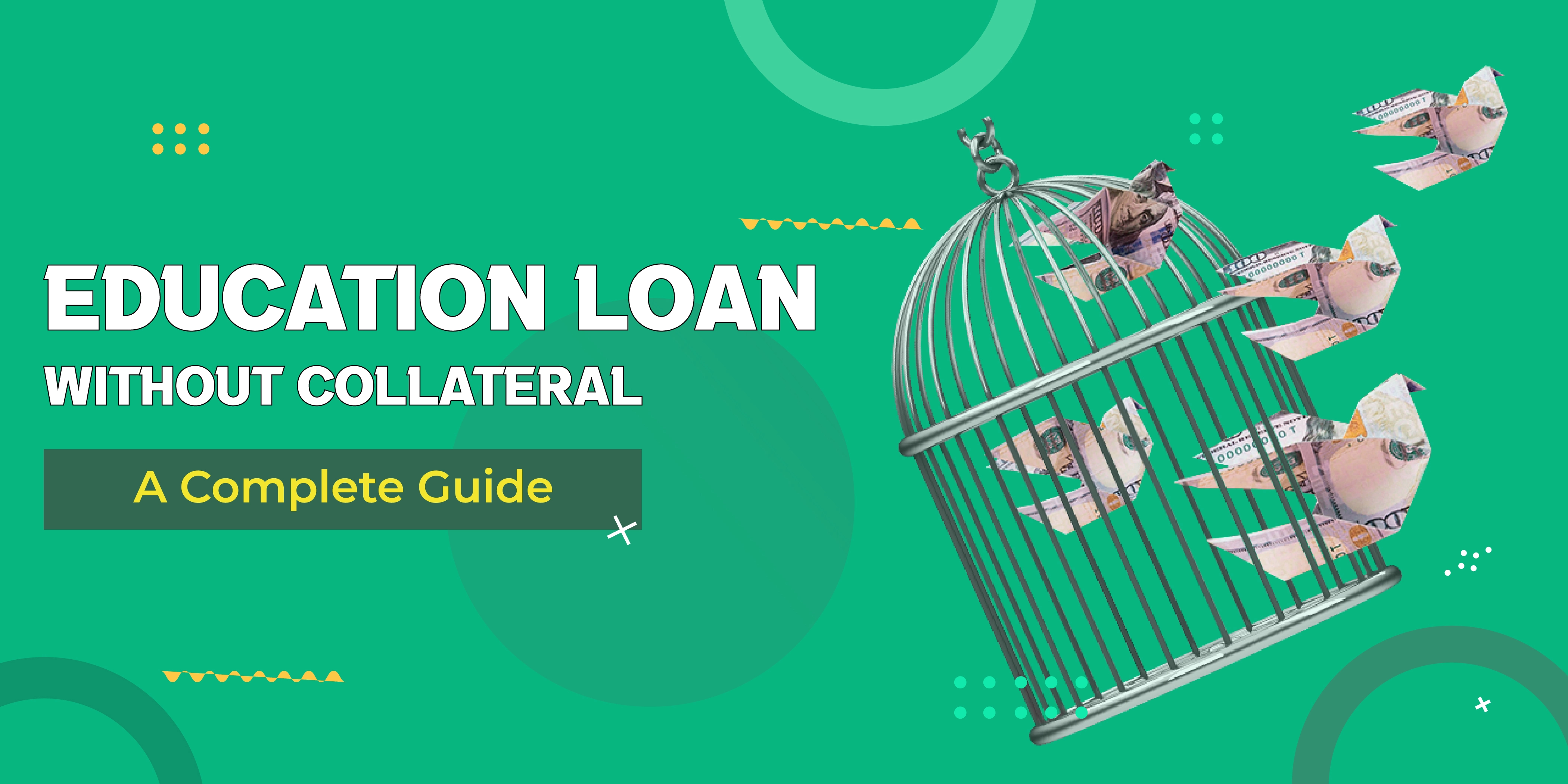https://www.wemakescholars.com/blog/issues-and-solutions-of-non-collateral-education-loan
Non-Collateral Education Loan: Common Issues & Their Solutions
Non-Collateral/ Unsecured Education Loan | Updated

Many students prefer a non-collateral education loan to fund their higher studies abroad since the process is pretty straightforward with less paperwork and doesn't need the pledging of assets as collateral security.
This is best suited for candidates who require an education loan in a short period of time or who do not own assets with a high market value.
However, there are many common issues that students may come across during their education loan process. This article aims to highlight some of those common issues faced by candidates in their non-collateral education loan process.
These common issues are also the top reasons behind an education loan rejection by lenders. In this article, we've also addressed a few FAQs related to each particular issue that is commonly asked by students. With that being said, let's begin.
1. CIBIL Score Issues
Almost all private lenders like NBFCs and private banks consider several aspects of your and your co-applicant profile. And they are quite strict when it comes to one particular metric, the CIBIL score.
Now, students face issues when either their or their co-applicant's CIBIL score shows low on the CIBIL report. The reason behind a low CIBIL score could be anything from defaulting on previous loan payments to applying for too many credit cards {read the above-linked article on CIBIL score to better understand these aspects}.
The Solution
The solution to this is to go for secured education loans from public banks. When you mortgage your collateral, the lender gives you a loan based on the value of your mortgaged collateral.
Don't get me wrong, lenders will still verify your and your co-credit applicant's scores, but if you have collateral, a low credit score can be acceptable for an education loan, as long as the CIBIL report does not show any major issues such as ‘Loan write off’ or ‘loan settled’.
If you do not have collateral then what? Don't worry, our team at WeMakeScholars have handled multiple cases that had CIBIL issues and have come across every credit score issue possible, not every issue is resolvable but with our experience and knowledge, we can definitely maximize your chance of securing funds even with a low CIBIL score. So do reach out to us by requesting a callback.
The FAQs related to CIBIL score issues
a) What is a CIBIL Score? How is it calculated?
CIBIL (Credit Information Bureau of India Ltd.) is an organization that keeps track of an individual’s credit information. The CIBIL calculates a score based on an individual’s credit history. This score is often used by all the education loan lenders to determine the creditworthiness of the loan applicants.
A CIBIL score is generally calculated based on the loan transactions made by candidates. CIBIL assigns you a score between 300 and 900 based on your credit history. A score closer to 900 is considered to be a good score and vice versa.
b) Under what circumstances will my CIBIL score be affected?
Your CIBIL score is never stable. This score keeps varying depending on the credit transactions conducted by you. When an individual borrows a loan (personal, car, education), their CIBIL score is affected. It reduces when you borrow a loan and, according to the pattern of your loan repayment, can increase or decrease. Failure to repay your pending loans will lead to a bad CIBIL score. This can ruin your chances of getting unsecured education loans for foreign studies.
c) What is the benchmark CIBIL score that a candidate needs to maintain in order to qualify for a non-collateral education loan?
For an unsecured abroad education loan, A CIBIL score of around 700 or above is a must as below this score, the chances of getting an unsecured education get slim. Both co-applicants, as well as loan applicants, are required to maintain this score in order to undergo their education loan process without a lot of issues.
-
- If your CIBIL score is low because you failed to pay your credit card dues, this issue can be resolved within no time and your CIBIL score will be back to normal.
- If your CIBIL report shows serious issues like loan write-off/ loan waive-off, loan settled, or cheque bounces, banks would never approve your loan application.
2. Financial Co-applicant Income Issues
The financial profile of your co-applicant is greatly considered by private lenders for approving unsecured education loans. This is because private lenders ask for payment of interest during the moratorium period. And while students are abroad, their co-applicant are supposed to be making those payments.
Also, unlike secured loans where the lender can use the pledged collateral to recover the amount in an event of default, in an unsecured education loan the financial co-applicant is supposed to pay the loan if for some reason a student fails to pay it back.
The issues ensue when the income of your co-applicant is low. The requirement for a salaried and self-employed co-applicant is also different for different lenders. And not just income, private lenders also check the age and reject the loan application for aged co-applicant and co-applicant with low income.
The Solution
If the income is too low, say the minimum income lenders need is 5 lakhs per annum, but your co-applicant earns 2 lakhs per annum, then it is better to try for a secured education loan from public banks. If you do not have collateral of your own, you can also pledge third-party collateral (relatives, friends) if they are fine with it.
If the income is slightly lower than the required minimum income, say 4 lakhs (as per the above example), you can add additional co-applicant with income say 3 lakhs per annum, and your loan application will be approved.
The problem here is you will not know what is the minimum ask by the lender for approving the loan (as it depends on case to case) and many a time lenders simply reject the loan application without explaining to you why. This is why we recommend you apply for your education loan via WeMakeScholars as your financial officer will analyze your profile and will tell you in advance if any such issue emerges and will suggest you the best solution for the same.
The FAQs related to financial co-applicant income issues
a) What are the mandatory financial documents my co-applicant needs to provide for an abroad education loan?
- Documents to be submitted by salaried co-applicants:
- Latest Salary slips (of the last 3 months)
- Form 16 of the last 2 yrs.
- Employers ID card
- ITR of last 2 yrs
Documents to be submitted by self-employed co-applicants:
- ITR of last 3 yrs
- Last 3 yrs Balance sheet and Profit & Loss account (only if self-employed)
- Proof of Business address
b) My co-applicant has not filed his ITR. Will this affect my chances of getting an education loan?
Ideally, the co-applicant’s ITR of the past two years is a compulsory document required by banks and NBFCs in the non-collateral education loan process. Hence, there is a high chance that your assigned loan officer of the lending NBFC or private bank may disagree to process your loan application.
c) My father does not have any income source. Who do I name as my financial co-applicant?
In the education loan process, lenders accept parents, siblings, spouses, parents-in-law as financial co-applicants. You can add additional financial co-applicant to your loan application.
If you find yourself in a similar situation before beginning your unsecured education loan process, get in touch with us at the earliest opportunity.
3. Education Loan Disbursement Issues
When a bank transfers the education loan funds to students concerned account (Fee to university and rest to the student) is referred to as 'disbursement'.
Students face issues when they go to countries like Canada, Germany Australia, etc where they are required to transfer their tuition fee or 1-year living expenses prior to their visa process as a requirement set by embassies for the student visa process.
Students face issues because when they ask for disbursement from their lending bank, they decline and ask for a visa first. But you need the disbursement for the visa and without the visa, banks are not willing to disburse the amount. How do you avoid the catch 22 here?
The Solution
Although almost all lenders have made policies as per which they can disburse the amount before your visa process, it is just that not every banks’ officials at the branch are aware of education loan policies. Students are advised to check with their lender before their loan process, whether they’ll pre-visa disburse the amount or not. And to avoid this trouble altogether, you know whom to approach.
The FAQs related to education loan disbursement issues
a) What is a pre-visa disbursement?
When banks release a portion of the education loan to students in order to help them fulfill certain financial prerequisites before their visa process, it is called a pre-visa disbursement. Apart from certain universities in the USA, the immigration rules in Germany and Canada require students to deposit a certain amount of money in order to qualify for their student visas. The Blocked Account requirements for Germany, the GIC account requirement for Canada are a few examples.
b) What steps should I follow to get my pre-visa disbursement faster?
The education loan disbursement process of most NBFCs and private banks is a hassle-free process. When they reach this phase of the education loan process, students simply need to submit the relevant documents which justify their need for a pre-visa disbursement. Once they complete this formality, they may easily avail of their education loan sanction letter or a pre-visa disbursement, whichever is required by candidates.
c) I am facing an issue related to the disbursement of my living expenses, how can this be resolved?
Candidates who register for the unsecured education loan process with the help and assistance of the financial team of WeMakeScholars can simply get in touch with their relationship managers for any assistance regarding their disbursement process. If you had borrowed your NBFC education loan directly from the lender, you may approach their customer care section for assistance.
This article lists some of the issues/FAQs most commonly listed/asked by a lot of students who had registered for education loans without collateral with the financial team of WeMakeScholars. Do keep reading our blog to gain more insight into the education loan process.




Kindly login to comment and ask your questions about Scholarships & Education Loans